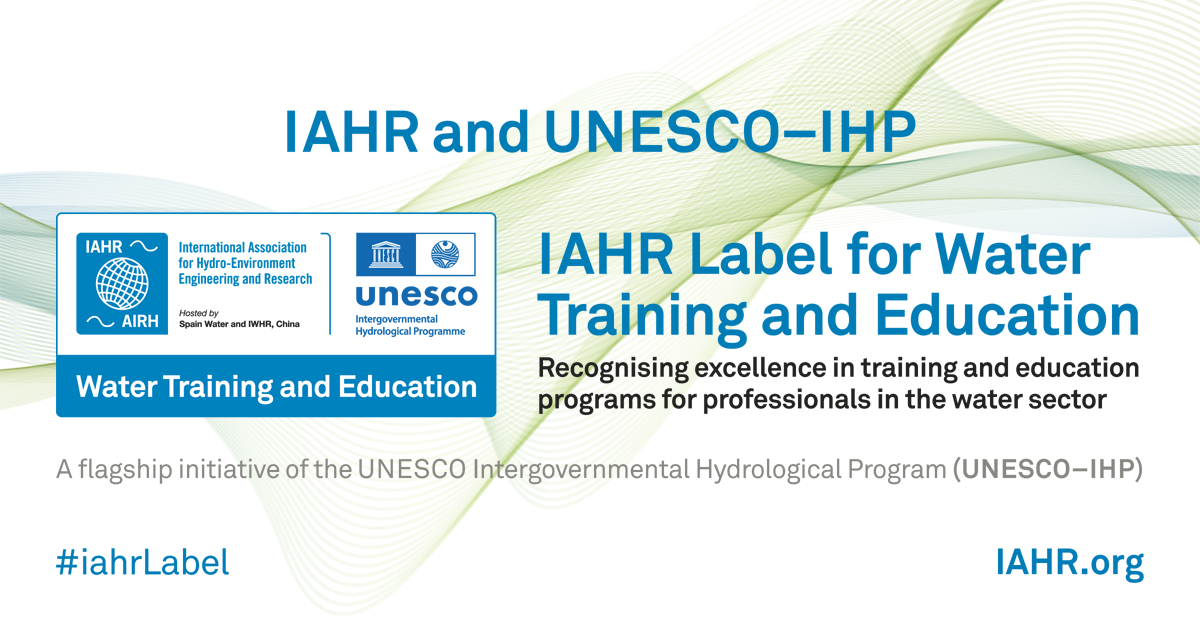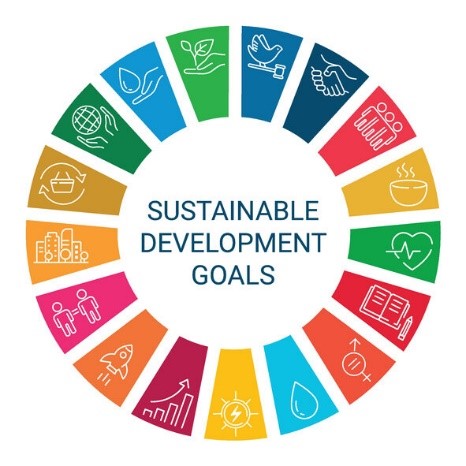IAHR Label for Water Training and Education. A Flagship Initiative of UNESCO-IHP

Brochure Recent Updates Open to Whom How to Apply Directory Labelled Programmes FQAs Keep Updated In Spanish
IAHR Label for Water Training and Education is a flagship initiative endorsed by the Council of UNESCO-IHP (Intergovernmental Hydrological Programme)
The IAHR Label distinguishes high quality education and training programmes in the water sector
Why obtain the IAHR Label?
The label provides quality assurance to current and future students or trainees, and provides training organisations with a globally-identifiable accolade to enhance their reputation within the competitive water education market.
Recipients of the IAHR Label will gain access to exclusive resources depicting the IAHR Label to use within their own marketing materials.
A programme that is endorsed by the IAHR label is:
Internationally recognised as providing excellence in water-related training and education
Credible and trusted
Fit for purpose, with clear learning outcomes
Being taught by verified experts in the field
Aligned with the UN Sustainable Development Goals
Who is eligible for the IAHR Label?
 Any institution or organisation that is providing vocational training, BSc, MSc and PhD programmes focusing on water-related education and training.
Any institution or organisation that is providing vocational training, BSc, MSc and PhD programmes focusing on water-related education and training.
Application process
Access the information and resources on the IAHR Label, including:
- The Brief Brochure with key information
- The Full Brochure with more information.
- The video
- Our FAQs
2. Fill in the self-assessment report and a cover page explaining for which program this request is submitted. If there are any questions, please contact label@iahr.org.
3. Submit the report to the labelling secretariat at label@iahr.org (annexes preferably should be submitted in English).
4. The IAHR Executive Committee will assess the application and make a decision on the outcome. If you are not satisfied with the decision, you can appeal by email to label@iahr.org.
5. If successful, pay the fee to have your program endorsed for a duration of five years (200 euros per year).
6. Liaise with the IAHR to promote the endorsement of your programme and to gain access to IAHR Label resources to integrate into your marketing materials.

Why was the IAHR Label introduced?
Achieving Sustainable Development Goal 6 (SDG 6) – Clean Water and Sanitation for All – by 2030 requires urgent action, and skilled water professionals are essential to meet this challenge.
The education and training of water professionals is an absolute priority that will not only benefit SDG 6 but also help tackle climate change impacts, food security, biodiversity preservation, energy transition, and social development.
The IAHR label is supporting and promoting excellence in water education, and a holistic approach to water engineering.
Recent news and updates
October 21, 2025: Discover the IAHR Label for Water Training and Education
October 21, 2025: IAHR awards the IAHR Label for Water Training and Education to Hohai University for the 'Coastal Dynamics' of Harbour, Waterway and Coastal Engineering programme
October 20, 2025: IAHR awards the IAHR Label for Water Training and Education to Ludovika University of Public Service, Hungary for the Degree on Civil Engineering (BSc)
August 1, 2025: IAHR awards the eighth IAHR Label for Water Training and Education to Incheon National University, Korea.
June 26, 2025: A Special Session on Education and Professional Development: The Needs of Water Professionals in a Changing Environment and Society was held during the 41st IAHR World Congress in Singapore.
June 16, 2025: IAHR awards the seventh IAHR Label for Water Training and Education to Universitat Politècnica de Catalunya (UPC), Spain.
June 11, 2025: The IAHR Label for Water Training and Education has been presented at UNESCO Headquarters in Paris during the celebration of the 50th anniversary of the UNESCO Intergovernmental Hydrological Programme (IHP).
June 11, 2025: IAHR awards the sixth IAHR Label for Water Training and Education to the Nanjing Hydraulic Research Institute (NHRI), China.
June 10, 2025: IAHR awards the fourth and fifth IAHR Label for Water Training and Education to Universiti Sains Malaysia.
February 3, 2025: IAHR awards the second and third IAHR Label for Water Training and Education to UNSW Sydney, Australia.
November 29, 2024: IAHR awards the first IAHR Label for Water Training and Education to HYDROPROTECH, University of Côte d'Azur, France.
June 10, 2024: The IAHR Label for Water Training and Education is now a Flagship Initiative of UNESCO-IHP

IAHR Label - Frequently Asked Questions (FAQs)
1. Is the label available for programs taught in any language?
Yes. The label is available for programs taught in any languages.
2. What are the eligibility criteria for a program to receive the IAHR Label?
The IAHR Label certifies any institution or organisation providing vocational training, BSc, MSc and PhD programs focusing on water-related education and training.
It cannot be provided to an individual.
Before any evaluation is carried out the level and orientation of the program seeking the IAHR Label must be clearly stated
3. What is the assessment criteria?
IAHR will evaluate best practices in water education based on the information provided in the self-assessment report. Sections include:
· Teaching-learning environment
· Student assessment
· Internal quality assurance system
4. What is the self-assessment report?
The self-assessment report is the primary document your programme uses to demonstrate its compliance with the IAHR criteria for good practice in water education. The report is the basis for the review team’s judgment of whether the programme meets our criteria for conferring an IAHR Label.
The self-assessment report is a self-contained document comprising a maximum of 50 pages (excluding appendices).
The contents and format of these documents are not subject to any prior requirements. The reviewers may request additional information but will exercise restraint in this respect. More info about the structure of the self-assessment report is on page 6 of the full brochure.
5. Can I apply for the IAHR Label to be awarded to more than one programme?
In the self-assessment report, applicants must include information related to the specific programme for which they are seeking the IAHR Label. If applying for more than one programme, a separate self-assessment report must be submitted.
6. How long is the IAHR Label valid once awarded?
The label is granted for a maximum duration of five years and is eligible for renewal. Its validity cannot surpass the national accreditation period of the degree, in the country where the education takes place. It is automatically revoked upon the expiration of the national accreditation.
7. What is the fee for the programme?
1,000 euros per program for a duration of five years (so 200 euros per year). For multiple programmes please, contact label@iahr.org.
8. Is the IAHR Label recognised globally?
Yes. The IAHR approach is inspired by Global Standards and Guidelines for quality assurance such as the European Higher Education Area and many international accreditation bodies.
9. Can the IAHR Label be used in marketing materials?
Yes. Recipients will receive resources depicting the IAHR Label and are eligible to use these on their website and marketing materials.
10. Who is on the Label Committee?
Philippe Gourbesville, France.
Ioana Popescu, The Netherlands.
Reinhard Hinkelmann, Germany.
The Label Committee is supported by a Panel of Experts:
Ana Margarida Bento, Portugal.
Ioana Popescu, The Netherlands.
Janice Ayog, Malaysia.
José M. Carrillo, Spain.
Maria Paula Mendes, Portugal.
Mário Franca, Germany.
Michael Nones, Poland.
Muhammad Ahmad, Nigeria.
Philippe Gourbesville, France.
Reinhard Hinkelmann, Germany.
Victor Manuel Peñaranda-Vélez, Mexico.
Supporting institutions:
Asociatia Romana a Apei, Romania.
IHE Delft, The Netherlands.
Société Hydrotechnique de France, France.
Vietnam Water Resources Association, Vietnam.